Community Engagement Unit helps with record-clearing
IMPORTANT NEWS! Clean Slate 3.0 expands record-sealing eligibility in Pennsylvania starting Feb. 12, 2024
Details and LASP flyer: lasp.org/news/updated-clean-slate-law-expands-eligibility-for-record-sealing
Record-clearing paves the way for improved job opportunities and increased access to education and housing.
Legal Aid of Southeastern PA is helping people clear their records in Bucks, Chester, Delaware and Montgomery counties. Our Community Engagement Unit may be able to help you with:
Expungements
Clean Slate (limited access to records)
Pardons
Contact the LASP Helpline at 877-429-5994 Monday-Friday, from 9 a.m.-1 p.m., or apply online.
LASP also offers free virtual and in-person legal clinics, often in collaboration with legislators and community partners. Check lasp.org/events for upcoming clinics.
The photos show a sampling of Legal Aid of Southeastern PA attorneys and interns at outreach clinics and community events throughout the area, held in collaboration with partner organizations and legislators. Stay tuned to lasp.org/events for upcoming virtual and in-person clinics. LASP helps clients with expungements, Clean Slate (limited access) and pardons.
CLEANING UP YOUR CRIMINAL RECORD
(Updated June 3, 2025)
Is your criminal record causing you problems getting a job? Legal Aid of Southeastern Pennsylvania (LASP) may be able to help you by:
Advising you if your criminal or juvenile record can be expunged or sealed.
Helping you expunge or seal an eligible record.*
Correcting errors in your record.
Advising you on how to try to get a pardon to erase a criminal conviction.
Providing representation at an administrative hearing where your record is being used to deny you an occupational license.
LASP CANNOT provide representation in criminal matters or help you find a job.
How to get help
If you need legal assistance, please call our toll-free Helpline at 877-429-5994, Monday-Friday from 9 a.m.-1 p.m. or apply online.
Here’s what you will need to do before your record can be expunged.
We work with clients on the following items. You do NOT need to start or complete them before contacting Legal Aid of Southeastern PA.
Before you can expunge your record, you will need to pay off any related fines or costs. LASP works with clients and the courts to set up payment plans and/or reduce or waive court costs and fees. We are unable to get fines or restitution waived.
Records can be sealed as long as no restitution is owed.
You may also need to order an official background check from the PA State Police, which costs up to $22.
Options for clearing your criminal record
Expungement
EXPUNGEMENT is the complete destruction of a criminal record. Expungement is available for:
Non-conviction dispositions (charges were dismissed, withdrawn, nolle prossed, not guilty, etc.)
ARD/Section 17 if you have completed all of the requirements
Summary convictions if you have five subsequent years free from arrest
Summary convictions if you were under 18 at the time of the offense, are now over 18, AND six months have passed since you completed the sentence and paid the fine
Misdemeanor and felony convictions if you are 70+ years old and have a ten-year arrest free period since the end of your sentence (including probation or parole)
If acquitted on all charges, expungement is automatic.
Sealing (or “limited access”)
Starting Feb. 12, 2024, more Pennsylvania residents with criminal records will have more chances for a fresh start. The new Clean Slate 3.0 law expands record-sealing, and shortens the timeframe.
Sealed records do not need to be disclosed, unless required by federal law.
A sealed record cannot be seen on most background checks.
A sealed record cannot be seen on most background checks.
If a conviction is not sealed automatically, a petition must be filed in court. Legal Aid of Southeastern PA may be able to help low-income residents of Bucks, Chester, Delaware and Montgomery counties with this process.
Low-level felony convictions which may be sealed after 10 years:
Many drug crimes with shorter sentences
Theft, including retail theft and receiving stolen property
Trespass
Forgery & fraud, including access/device fraud, bad checks, ID theft & welfare fraud
Criminal mischief
Conspiracy to commit an eligible crime
Misdemeanor convictions which may be sealed after 7 years:
Recklessly endangering another person
Simple assault
Driving under the influence (DUI)
Disorderly conduct
Resisting arrest
Harassment
Terroristic threats
Possession of an instrument of a crime
Prostitution
Summary convictions will be sealed automatically after 5 years, starting in June 2024.
Pardon
A PARDON is an act by the governor of Pennsylvania that allows a conviction to be erased from your criminal record.
In Pennsylvania, a pardon is generally the only way that felony and misdemeanor convictions can be expunged, although some felony and misdemeanor convictions may be eligible to be sealed.
Although it is difficult to get a pardon, you might consider applying for one if you are are considering working outside of Pennsylvania, renewing or applying for an imigration status or are in a field subject to federal requirements about criminal records.
If you are successful, your criminal record will be automatically expunged!
PARDON PACKET
PARDONS
(Updated Dec. 6, 2021)
Legal Aid of Southeastern PA is assisting people in Bucks, Chester, Delaware and Montgomery counties with the pardon process.
If you qualify for our services, LASP will help you through these steps.
Apply by calling 877-429-5994 Monday-Friday, 9 a.m.-1 p.m., or apply online at lasp.org/apply.
How to get a pardon in Pennsylvania
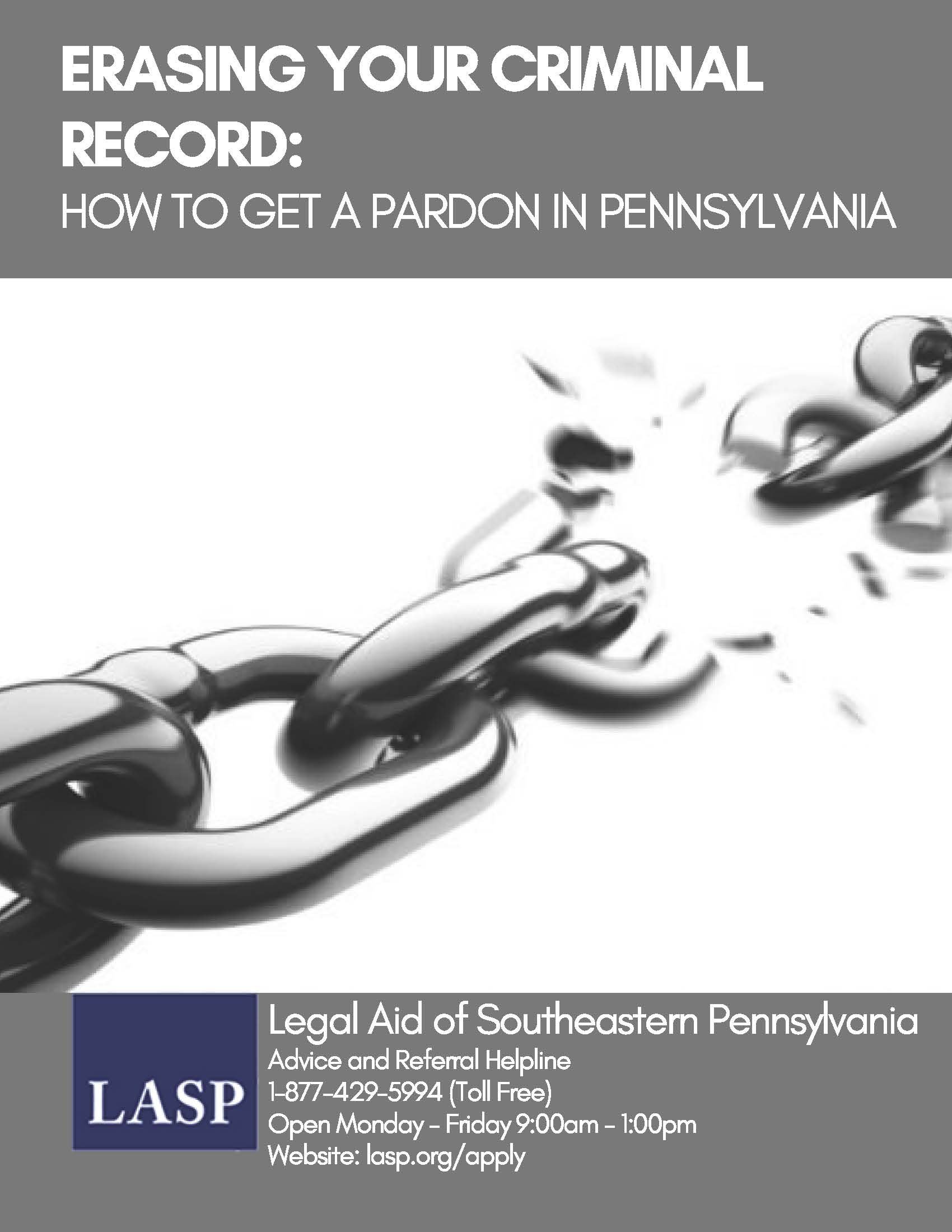
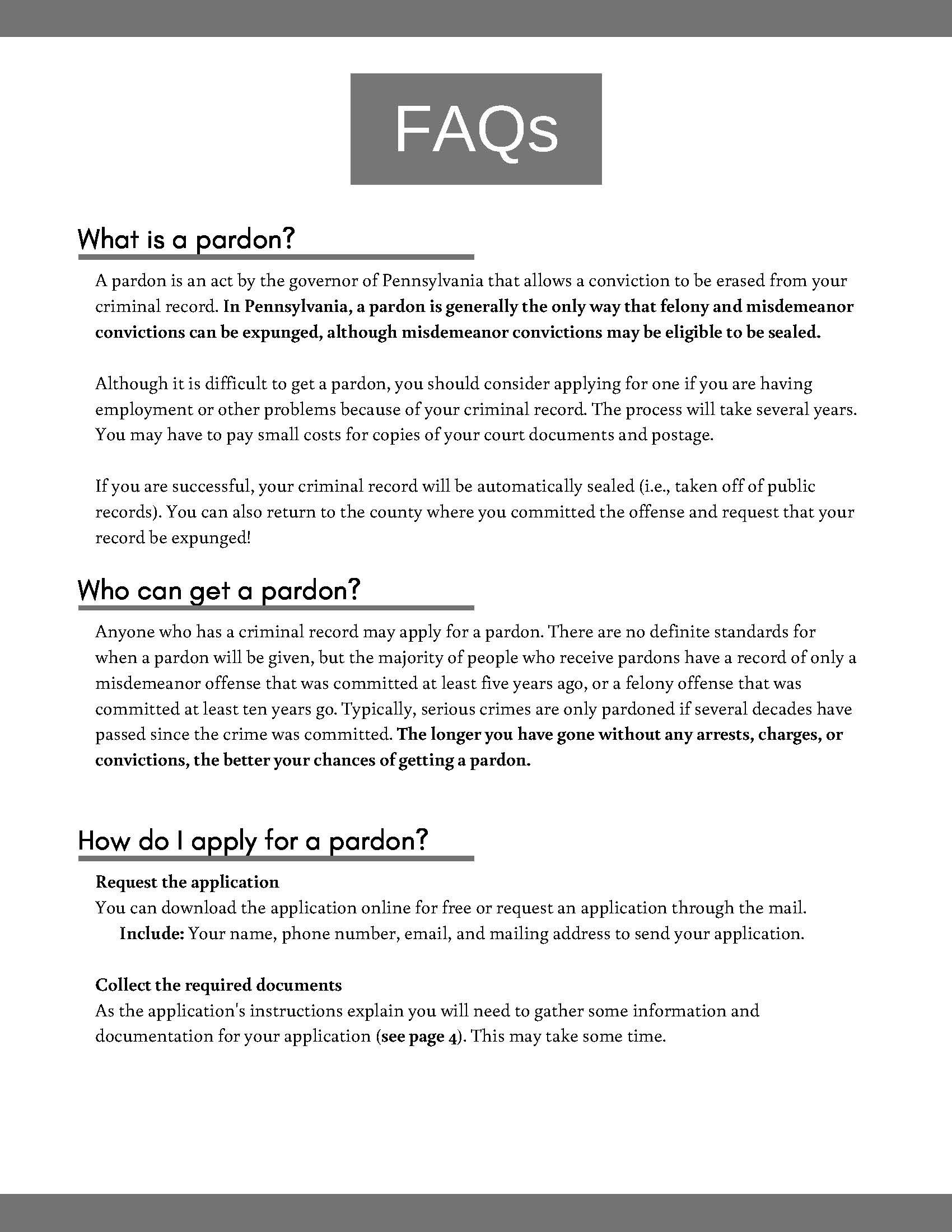
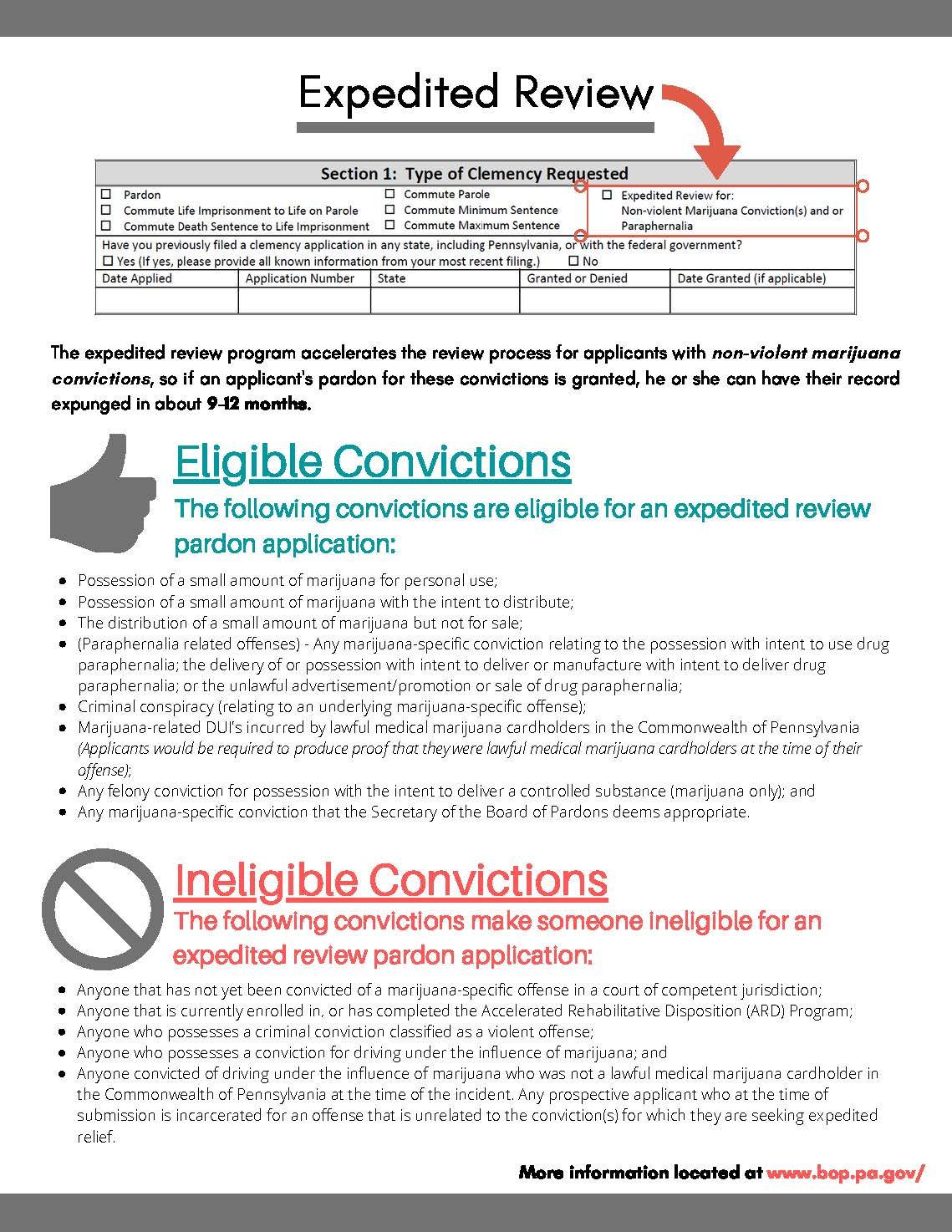
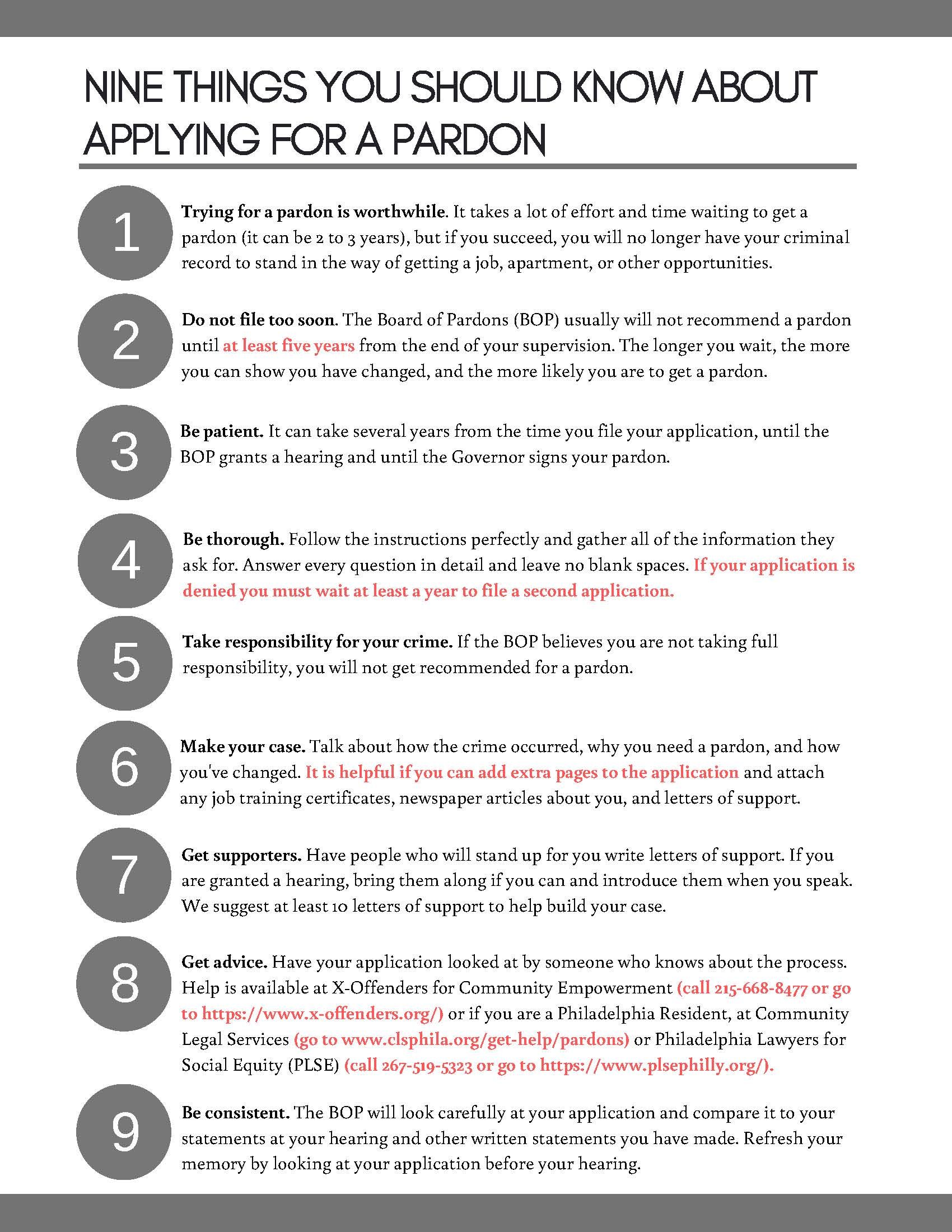
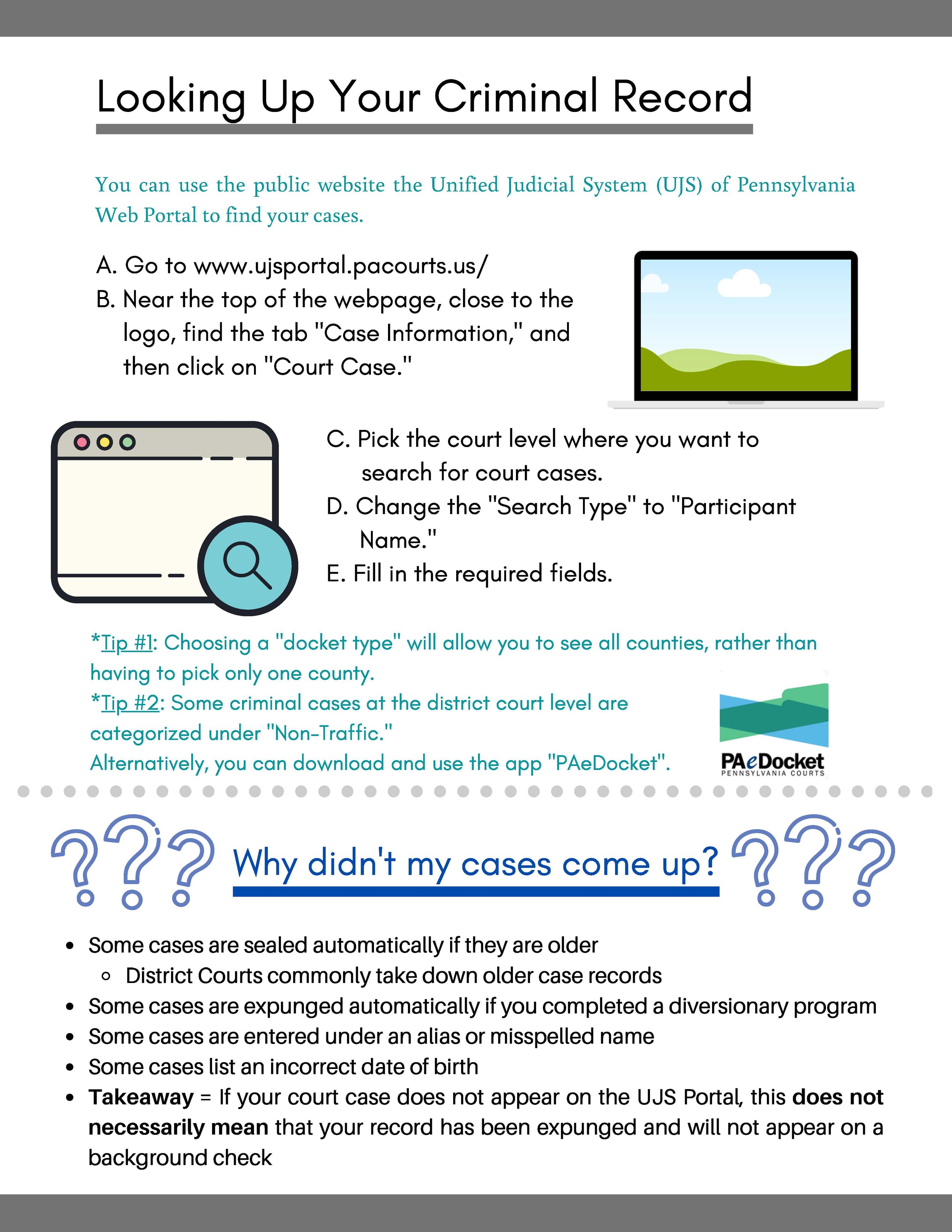
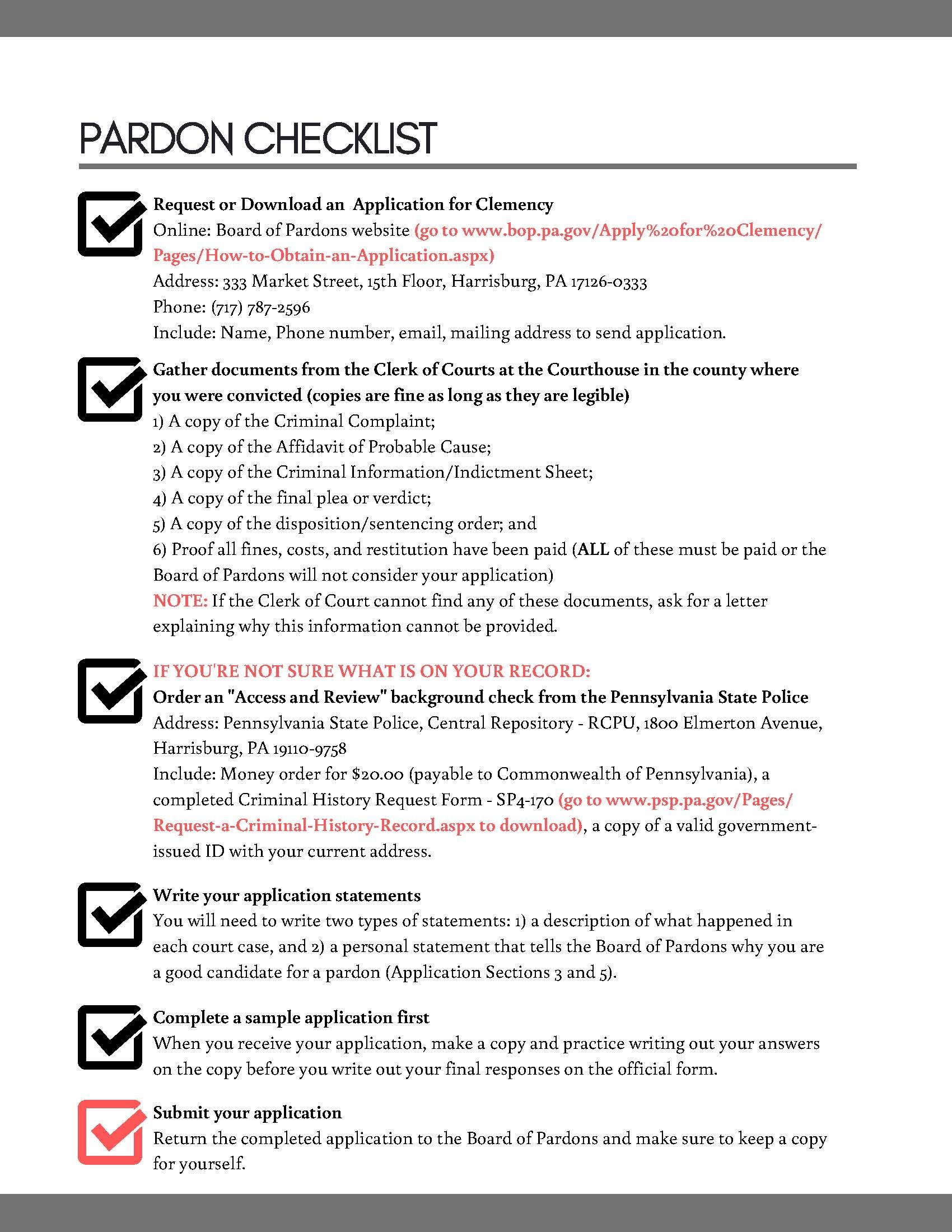
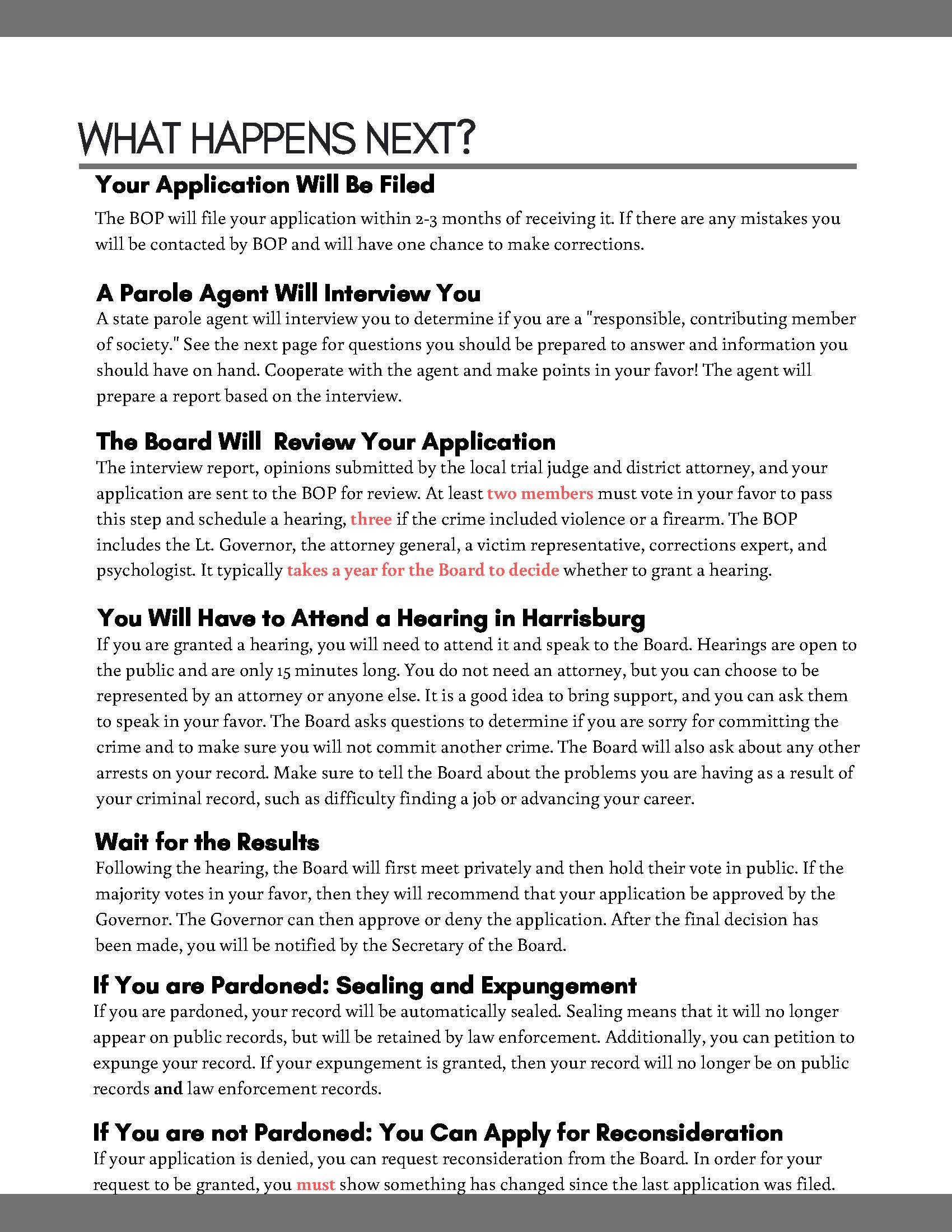
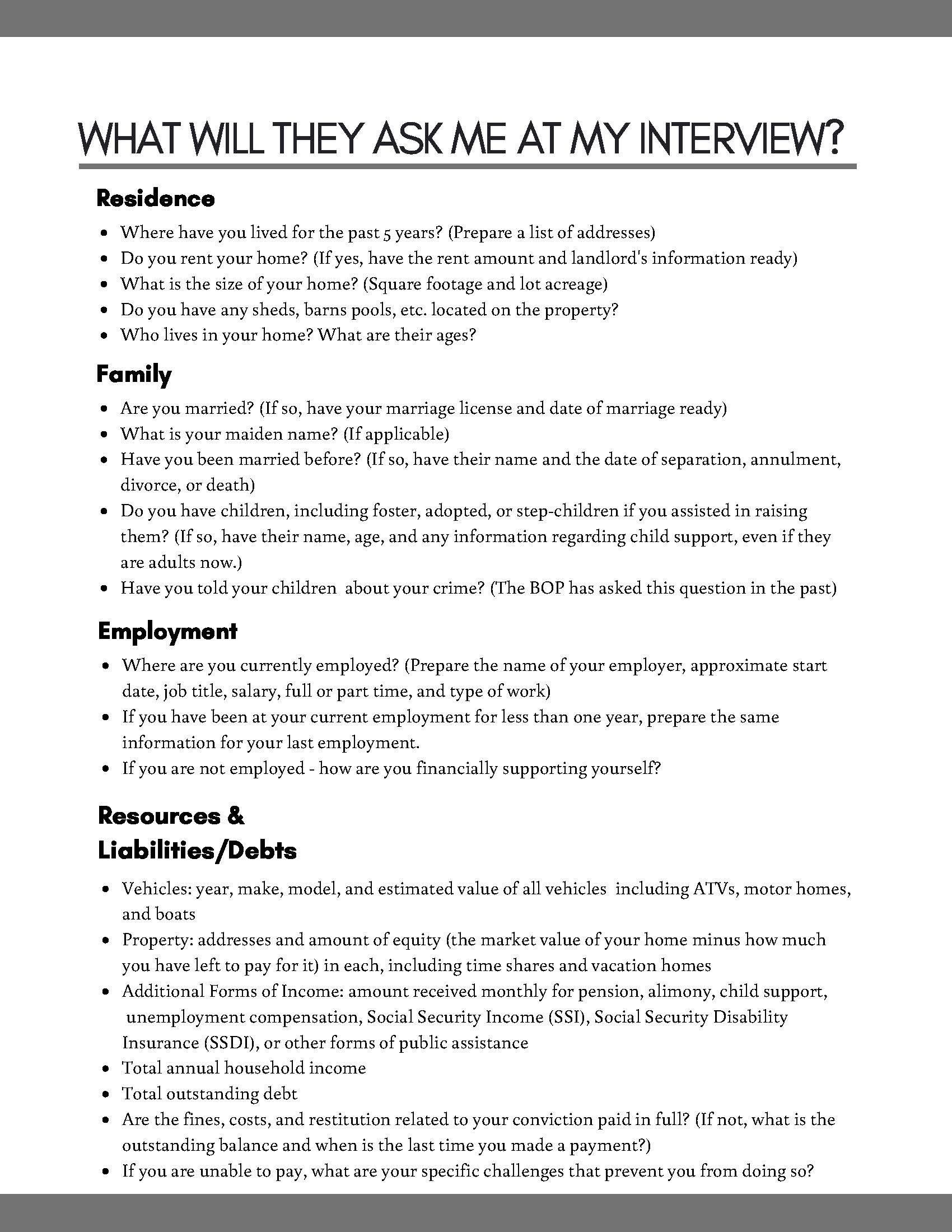
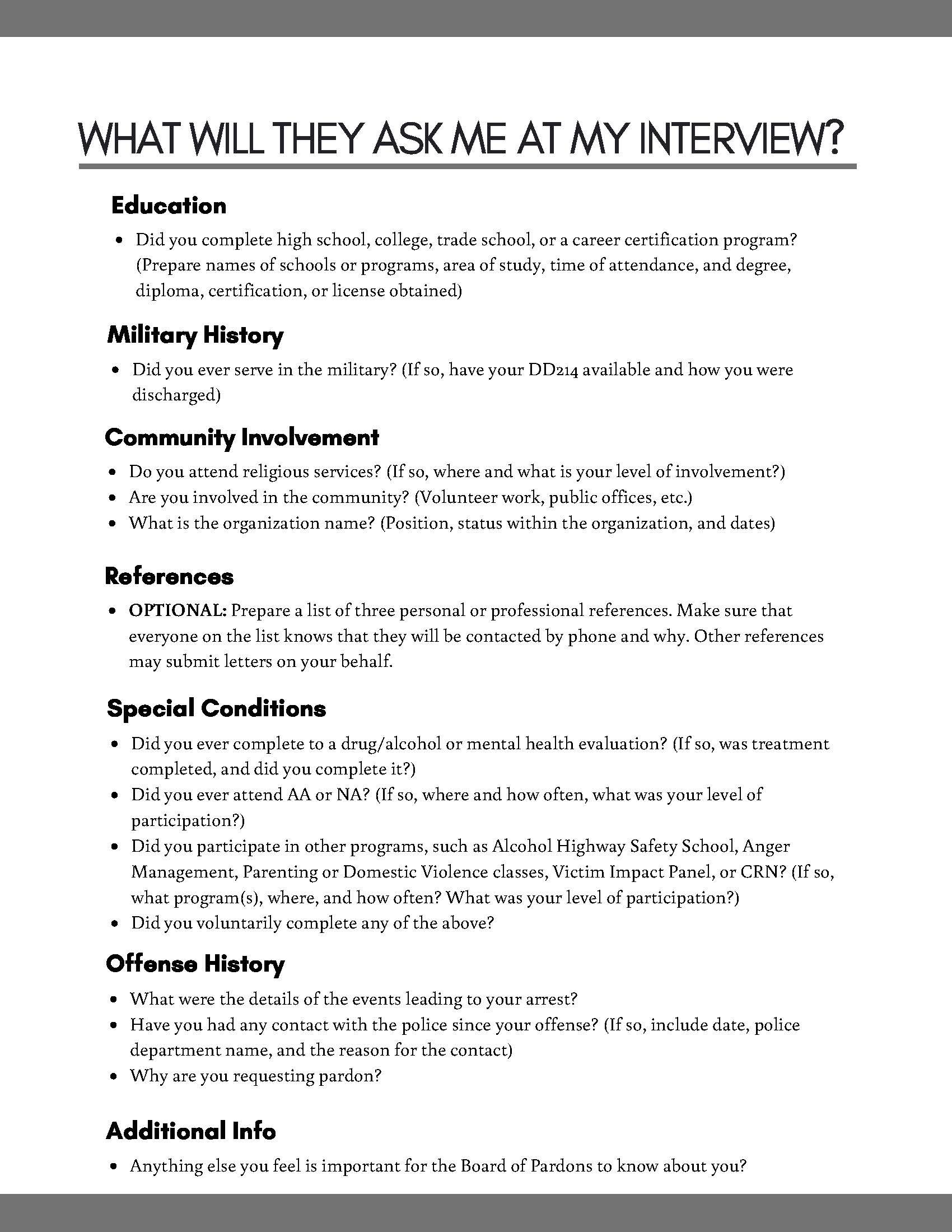
What is a pardon?
A pardon is an act by the governor of Pennsylvania that allows a conviction to be erased from your criminal record.
In Pennsylvania, a pardon is generally the only way that felony and misdemeanor convictions can be expunged, although misdemeanor convictions may be eligible to be sealed.
Although it is difficult to get a pardon, you should consider applying for one if you are having employment or other problems because of your criminal record. The process will take several years. You may have to pay small costs for copies of your court documents and postage.
If you are successful, your criminal record will be automatically sealed (i.e., taken off of public records). You can also return to the county where you committed the offense and request that your record be expunged!
Who can get a pardon?
Anyone who has a criminal record may apply for a pardon. There are no definite standards for when a pardon will be given, but the majority of people who receive pardons have a record of only a misdemeanor offense that was committed at least five years ago, or a felony offense that was committed at least ten years go. Typically, serious crimes are only pardoned if several decades have passed since the crime was committed.
The longer you have gone without any arrests, charges, or convictions, the better your chances of getting a pardon.
How do I apply for a pardon?
Request the application (You can download the application online for free or request an application through the mail.)
Include: Your name, phone number, email, and mailing address to send your application.
Collect the required documents
As the application's instructions explain, you will need to gather some information and documentation for your application. This may take some time.
Expedited review
The expedited review program accelerates the review process for applicants with non-violent, non-sexual convictions. The process is about half the time of a traditional pardon.
Eligible convictions
The following convictions are eligible for an expedited review pardon application:
Misdemeanor Retail Theft or Misdemeanor Marijuana Possession if last contact with the criminal justice system was 5 or more years ago;
One non-violent, non-sexual conviction if last contact with the criminal justice system was 10 or more years ago; or
Two or more non-violent, non-sexual convictions if last contact with the Criminal Justice System was 15 or more years ago.
Last contact with the Criminal Justice System includes:
Expiration of Maximum Sentence;
An Arrest Resulting in Pending Charges;
Expiration of Final Protection from Abuse (PFA) Order;
PFA Contempt;
A Non-Traffic Case (summary citation resolved at district court).
Ineligible convictions
Ineligible convictions include those related to illegal firearm possession, violent offenses, and sexual offenses.
A full list of disqualifying offenses can be found at: https://www.bop.pa.gov/Apply%20for%20Clemency/Pages/Expedited-Review-Program.aspx
More information about the pardon process is located at the Board of Pardons website, at www.bop.pa.gov/
9 things you should know about applying for a pardon
Trying for a pardon is worthwhile. It takes a lot of effort and time waiting to get a pardon (it can be 2 to 3 years), but if you succeed, you will no longer have your criminal record to stand in the way of getting a job, apartment, or other opportunities.
Do not file too soon. The Board of Pardons (BOP) usually will not recommend a pardon until at least five years from the end of your supervision. The longer you wait, the more you can show you have changed, and the more likely you are to get a pardon.
Be patient. It can take several years from the time you file your application, until the BOP grants a hearing and until the Governor signs your pardon.
Be thorough. Follow the instructions perfectly and gather all of the information they ask for. Answer every question in detail and leave no blank spaces. If your application is denied you must wait at least a year to file a second application.
Take responsibility for your crime. If the BOP believes you are not taking full responsibility, you will not get recommended for a pardon.
Make your case. Talk about how the crime occurred, why you need a pardon, and how you've changed. It is helpful if you can add extra pages to the application and attach any job training certificates, newspaper articles about you, and letters of support.
Get supporters. Have people who will stand up for you write letters of support. If youare granted a hearing, bring them along if you can and introduce them when you speak.We suggest at least 10 letters of support to help build your case.
Get advice. Have your application looked at by someone who knows about the process. Help is available at X-Offenders for Community Empowerment (call 215-668-8477 or go to www.x-offenders.org). If you are a Philadelphia resident, help is available at Community Legal Services (go to www.clsphila.org/get-help/pardons) or Philadelphia Lawyers for Social Equity (PLSE) (call 267-519-5323 or go to www.plsephilly.org).
Be consistent. The Board of Pardons will look carefully at your application and compare it to your statements at your hearing and other written statements you have made. Refresh your memory by looking at your application before your hearing.
Looking Up Your Criminal Record
You can use the public website, the Unified Judicial System (UJS) of Pennsylvania Web Portal, to find your cases.
Near the top of the webpage, close to the logo, find the tab "Case Information," and then click on "Court Case.
Pick the court level where you want to search for court cases.
Change the "Search Type" to "Participant Name."
Fill in the required fields.
Tips
Tip #1: Choosing a "docket type" will allow you to see all counties, rather than having to pick only one county.
Tip #2: Some criminal cases at the district court level are categorized under "Non-Traffic."
Alternatively, you can download and use the app "PAeDocket".
Why didn’t my cases come up?
Some cases are sealed automatically if they are older
District Courts commonly take down older case records
Some cases are expunged automatically if you completed a diversionary program
Some cases are entered under an alias or misspelled name
Some cases list an incorrect date of birth
Takeaway: If your court case does not appear on the UJS Portal, this does not necessarily mean that your record has been expunged and will not appear on a background check
Pardon checklist
Request or Download an Application for Clemency
Online: Board of Pardons website (go to www.bop.pa.gov/Apply%20for%20Clemency/Pages/How-to-Obtain-an-Application.aspx)
Address: 333 Market Street, 15th Floor, Harrisburg, PA 17126-0333
Phone: (717) 787-2596
Include: Name, Phone number, email, mailing address to send application.
Gather documents from the Clerk of Courts at the Courthouse in the county where you were convicted (copies are fine as long as they can be read)
A copy of the Criminal Complaint;
A copy of the Affidavit of Probable Cause;
A copy of the Criminal Information/Indictment Sheet;
A copy of the final plea or verdict;
A copy of the disposition/sentencing order; and
Proof all fines, costs, and restitution have been paid (ALL of these must be paid or the Board of Pardons will not consider your application)
NOTE: If the Clerk of Court cannot find any of these documents, ask for a letter explaining why this information cannot be provided.
If you’re not sure what is on your record
Order an "Access and Review" background check from the Pennsylvania State Police Address: Pennsylvania State Police, Central Repository - RCPU, 1800 Elmerton Avenue, Harrisburg, PA 19110-9758
Include: Money order for $20.00 (payable to Commonwealth of Pennsylvania), a completed Criminal History Request Form - SP4-170 (go to www.psp.pa.gov/Pages/Request-a-Criminal-History-Record.aspx to download), a copy of a valid government-issued ID with your current address.
Write your application statements
You will need to write two types of statements: 1) a description of what happened in each court case, and 2) a personal statement that tells the Board of Pardons why you are a good candidate for a pardon (Application Sections 3 and 5).
Complete a sample application first
When you receive your application, make a copy and practice writing out your answers on the copy before you write out your final responses on the official form.
Submit your application
Return the completed application to the Board of Pardons and make sure to keep a copy for yourself.
What happens after you submit your pardon application
Your application will be filed
The Board of Pardons will file your application within approximately a year of receiving it. If there are any mistakes, you will be contacted by BOP and will have a chance to make corrections.
A parole agent will interview you
A state parole agent will interview to determine if you are a "responsible, contributing member of society." (See next section for questions you should be prepared to answer and information you should have on hand.) Cooperate with the agent and make points in your favor! The agent will prepare a report based on the interview.
The Board of Pardons will review your application
The interview report, opinions submitted by the local trial judge and district attorney, and your application are sent to the Board of Pardons for review. At least two members must vote in your favor to pass this step and schedule a hearing, three if the crime included violence or a firearm. The BOP includes the Lt. Governor, the attorney general, a victim representative, corrections expert, and psychologist.
You will have to attend a hearing
If you are granted a hearing, you will need to attend it and speak to the Board. Hearings are currently virtual, but were done in person in the past. Hearings are open to the public and are only 15 minutes long. You do not need an attorney, but you can choose to be represented by an attorney or anyone else. The Board asks questions to determine if you are sorry for committing the crime and to make sure you will not commit another crime. The Board will also ask about any other arrests on your record. Make sure to tell the Board about the problems you are having as a result of your criminal record, such as difficulty finding a job or advancing your career.
Wait for the results
Following the hearing, the board will first meet privately and then hold their vote in public. If the majority votes in your favor, then they will recommend that your application be approved by the Governor. The Governor can then approve or deny the application. After the final decision has been made, you will be notified by the Secretary of the Board.
If you are pardoned: Sealing and Expungement
If you are pardoned, your record will be automatically expunged. Sealing means that it will no longer appear on public records, but will be retained by law enforcement. Additionally, you can petition to expunge your record. If your expungement is granted, then your record will no longer be on public records and law enforcement records.
If you are not pardoned: You can apply for reconsideration
If your application is denied, you can request reconsideration from the board. In order for your request to be granted, you must show something has changed since the last application was filed.
What will they ask me at my interview?
Residence
Where have you lived for the past 5 years? (Prepare a list of addresses)
Do you rent your home? (If yes, have the rent amount and landlord's information ready)
What is the size of your home? (Square footage and lot acreage)
Do you have any sheds, barns pools, etc. located on the property?
Who lives in your home? What are their ages?
Family
Are you married? (If so, have your marriage license and date of marriage ready)
What is your maiden name? (If applicable) Have you been married before? (If so, have their name and the date of separation, annulment, divorce, or death)
Do you have children, including foster, adopted, or step-children if you assisted in raising them? (If so, have their name, age, and any information regarding child support, even if they are adults now.)
Have you told your children about your crime? (The Board of Pardons has asked this question in the past.)
Employment
Where are you currently employed? (Prepare the name of your employer, approximate start date, job title, salary, full or part time, and type of work)
If you have been at your current employment for less than one year, prepare the same information for your last employment.
If you are not employed - how are you financially supporting yourself?
Resources and Liabilities/Debts
Vehicles: year, make, model, and estimated value of all vehicles including ATVs, motor homes, and boats
Property: addresses and amount of equity (the market value of your home minus how much you have left to pay for it) in each, including time shares and vacation homes
Additional Forms of Income: amount received monthly for pension, alimony, child support, unemployment compensation, Social Security Income (SSI), Social Security Disability Insurance (SSDI), or other forms of public assistance
Total annual household income
Total outstanding debt
Are the fines, costs, and restitution related to your conviction paid in full? (If not, what is the outstanding balance and when is the last time you made a payment?)
If you are unable to pay, what are your specific challenges that prevent you from doing so?
Education
Did you complete high school, college, trade school, or a career certification program? (Prepare names of schools or programs, area of study, time of attendance, and degree, diploma, certification, or license obtained
Military History
Did you ever serve in the military? (If so, have your DD214 available and how you were discharged)
Community Involvement
Do you attend religious services? (If so, where and what is your level of involvement?)
Are you involved in the community? (Volunteer work, public offices, etc.)
What is the organization name? (Position, status within the organization, and dates)
References
OPTIONAL: Prepare a list of three personal or professional references. Make sure that everyone on the list knows that they will be contacted by phone and why. Other references may submit letters on your behalf.
Special Conditions
Did you ever complete to a drug/alcohol or mental health evaluation? (If so, was treatment completed, and did you complete it?)
Did you ever attend AA or NA? (If so, where and how often, what was your level of participation?)
Did you participate in other programs, such as Alcohol Highway Safety School, Anger Management, Parenting or Domestic Violence classes, Victim Impact Panel, or CRN? (If so, what program(s), where, and how often? What was your level of participation?)
Did you voluntarily complete any of the above?
Offense History
What were the details of the events leading to your arrest?
Have you had any contact with the police since your offense? (If so, include date, police department name, and the reason for the contact)
Why are you requesting pardon?
Additional Information
Anything else you feel is important for the Board of Pardons to know about you?
LASP is helping clients with the expungements, Clean Slate and pardons
Legal Aid of Southeastern PA is assisting people in Bucks, Chester, Delaware and Montgomery counties with the record-clearing process, including expungements, Clean Slate (“limited access”) and pardons.
If you qualify for our services, LASP will help you through the steps outlined on this page.
Apply by calling 877-429-5994 Monday-Friday, 9 a.m.-1 p.m., or apply online 24/7 at lasp.org/apply.



